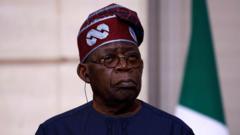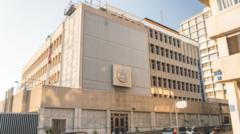The escalating tensions between the U.S. and Brazil highlight issues of free speech and governmental power in international relations.
**U.S. Government Challenges Brazilian Judge: Censorship Concerns Rise**

**U.S. Government Challenges Brazilian Judge: Censorship Concerns Rise**
The Trump Administration's new visa policy targets foreign officials involved in censorship, focusing on a controversial Brazilian Supreme Court justice.
Alexandre de Moraes, a Brazilian Supreme Court justice, is at the center of controversy as the Trump Administration takes a stand against censorship practices abroad. Over the past few years, Moraes has spearheaded a vigorous campaign to eliminate what he perceives as threats to Brazil's democratic integrity online, resulting in the ban of numerous social media accounts primarily representing right-leaning perspectives.
Supporters on the left hail him as a protector of democracy, recognizing his efforts to safeguard Brazilian institutions during the tumultuous events surrounding the attempted coup in 2022. However, critics on the right label him a government censor, alleging that he has overstepped his authority to silence opposing viewpoints online. Notable figures, including Elon Musk and the former Brazilian president Jair Bolsonaro, have openly contested his decisions, further complicating his already polarizing status.
In a recent announcement, U.S. Secretary of State Marco Rubio indicated that the United States would adopt a policy to limit visa access for foreign officials who engage in censorship of protected speech within the U.S. He cited Latin America specifically as a region plagued by such challenges. This policy marks a significant shift in U.S. diplomatic efforts, as it directly targets a Brazilian official, raising the potential for strained relations between the two influential nations in the Western Hemisphere. The ramifications of this decision may reverberate through both the political and social landscapes of Brazil, as well as its ties with the United States.
Supporters on the left hail him as a protector of democracy, recognizing his efforts to safeguard Brazilian institutions during the tumultuous events surrounding the attempted coup in 2022. However, critics on the right label him a government censor, alleging that he has overstepped his authority to silence opposing viewpoints online. Notable figures, including Elon Musk and the former Brazilian president Jair Bolsonaro, have openly contested his decisions, further complicating his already polarizing status.
In a recent announcement, U.S. Secretary of State Marco Rubio indicated that the United States would adopt a policy to limit visa access for foreign officials who engage in censorship of protected speech within the U.S. He cited Latin America specifically as a region plagued by such challenges. This policy marks a significant shift in U.S. diplomatic efforts, as it directly targets a Brazilian official, raising the potential for strained relations between the two influential nations in the Western Hemisphere. The ramifications of this decision may reverberate through both the political and social landscapes of Brazil, as well as its ties with the United States.





















